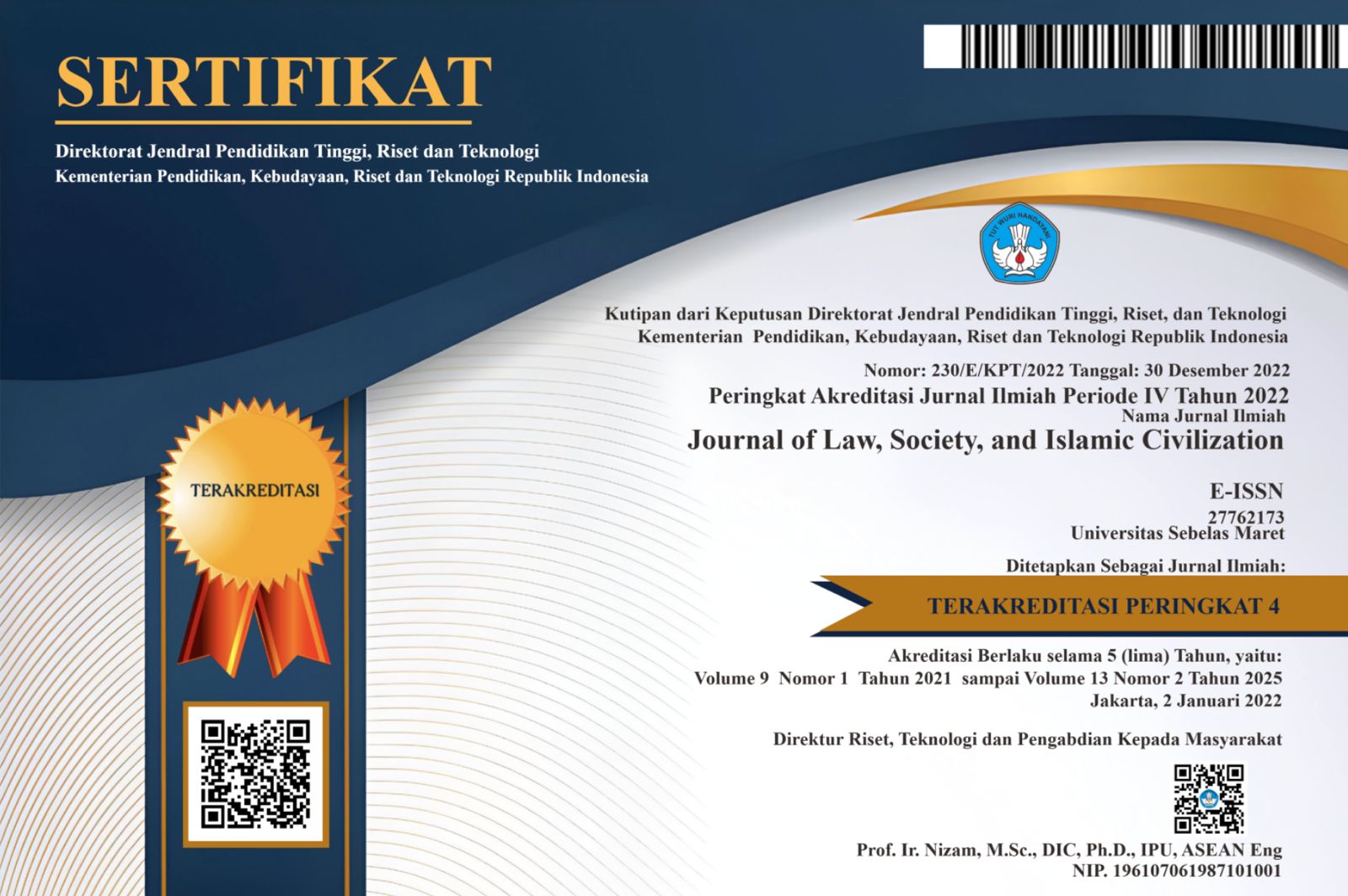Legal Architecture Beneficiary Owners at Individual Company; Reconstruction and Opportunity
Abstract
Keywords
Full Text:
PDFReferences
Alexander, F. H. (2020). The Benefit Stance: Responsible Ownership in The Twenty-First Century. Oxford Review of Economic Policy, 36(2), 341–361.
Antony, A., & Nurisman, E. (2023). Melawan Tindak Pencucian Uang Korporasi Melalui Pengesahan Rancangan Undang-Undang Perampasan Aset. Dinamika Hukum, 24(2), 216–228.
Levi, E. H. (2013). An Introduction to Legal Reasoning (13 ed.). University of Chicago Press.
Erdayani, R., Afandi, M., & Afandi, S. A. (2023). Bibliometric Analysis of Open Government: A Study on The Open Government Partnership. Indo-Fintech Intellectuals: Journal of Economics and Business, 3(2), 276–294.
Hadju, A. F. (2023). Beneficial Owner: Mengenali Pemilik Manfaat dan Sanksi Bagi Perseroan Terbatas. Jurnal Ilmiah Wahana Pendidikan, 9(12), 1–8.
Hafidzah, A., Rato, D., Setyawan, F., & others. (2024). Pertanggungjawaban Pidana Beneficial Owner dalam Kejahatan Korporasi di Bidang Sumber Daya Alam. As-Syar’i: Jurnal Bimbingan & Konseling Keluarga, 6(3), 1385–1397.
Jatmiko, B., & Prananingtyas, P. (2023). Kajian Yuridis Ketentuan Mengenai Pemilik Manfaat (Beneficial Owner) Perseroan. Notarius, 16(1), 236–252.
Kadir, Z. K., & Kadir, N. K. (2024). Examining of the Concept of Standard of Proof in the Indonesian Criminal Procedure Code. International Journal of Global Community, 7(2-July), 149–160.
Keuangan, P. P. dan A. T. (2023). Buletin Statistik Tahun 2023. Februari, 11(2). Jakarta: Pusat Pelaporan dan Analisis Transaksi Keuangan (PPATK).
Knobel, A., & Lorenzo, F. (2022). Beneficial Ownership Registration Around the World 2022. Available at SSRN 4304098.
Mason, J., & Potts, K. (2023). Construction Law: From Beginner to Practitioner. Routledge.
Mayrolla, P. R., Wiradi, I. G. N. Y., & Simbolon, Y. (2023). Analisis Prinsip Mengenali Pemilik Manfaat untuk Pencegahan serta Pemberantasan Tindak Pidana Pencucian Uang dan Terorisme. Justitia et Pax, 39(2), 333–363.
Negara, T. A. S. (2023). Normative Legal Research in Indonesia: Its Originis and Approaches. Audito Comparative Law Journal (ACLJ), 4(1), 1–9.
Razi, F., Rembrandt, R., & Mannas, Y. A. (2023). Kepastian Hukum Prinsip Pemilik Manfaat (Beneficial Ownership) Serta Peranan Notaris Berdasarkan Permenkumham Nomor 15 Tahun 2019. UNES Law Review, 5(4), 4683–4703.
Rumawi, R., Sariroh, S., Basuki, U., Towadi, M., Ali, M., & Supianto, S. (2023). Karakteristik Perseroan Terbatas Perorangan dalam Hukum Indonesia. Jurnal Hukum Bisnis, 12(02), 63–73.
Sari, J. A., Ismowati, M., Sukmawati, N., & Arma, N. A. (2022). Pengawasan Pelayanan Publik oleh Ombudsman RI Perwakilan Sumatera Barat. Publikauma: Jurnal Administrasi Publik Universitas Medan Area, 10(2), 127–136.
Setiawan, I., IP, S., & Johannes, A. W. (2024). Pengawasan Pemerintahan Dalam Ulasan Teori Dan Praktek. Bandung: CV. Rtujuh Media Printing.
Taekema, S., & van der Burg, W. (2024). Theoretical and Normative Frameworks for Legal Research. In Contextualising Legal Research (hal. 79–92). Edward Elgar Publishing.
Teichmann, F. (2020). Recent Trends in Money Laundering. Crime, Law and Social Change, Volume 73, 237–247.
Tingle, B. C. (2021). Two Stories About Shareholders. Osgoode Hall LJ 58(1), 57-108.
Urooj, S. (2024). A Dynamic Threshold Analysis of Effect of Financial Action Task Force (FATF) Measures on Financial Inclusion: Evidence From the World. Journal of Money Laundering Control, 27(4), 696–709.
Yolanda, C. (2024). Peran Usaha Mikro, Kecil dan Menengah (UMKM) dalam Pengembangan Ekonomi Indonesia. Jurnal Manajemen Dan Bisnis, 2(3), 170–186.
Zein, M. H. M., & Septiani, S. (2023). Ilmu Administrasi Negara. Jakarta: Sada Kurnia Pustaka.Refbacks
- There are currently no refbacks.












